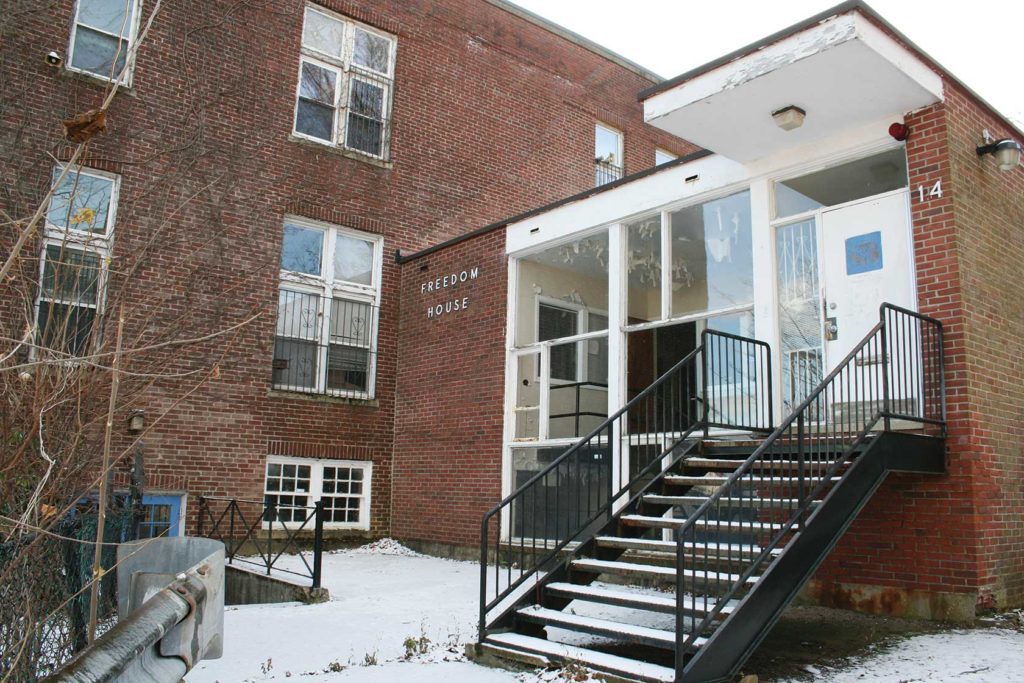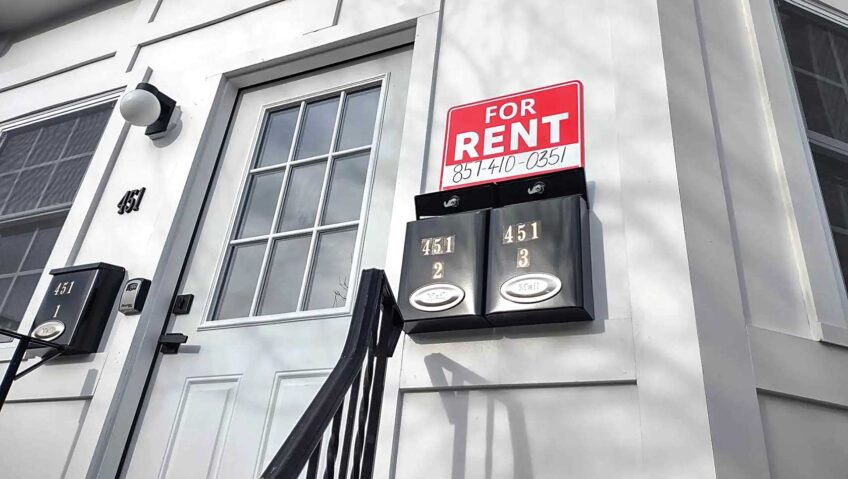A plea to save the Freedom House building
Activists seek historical designation, nonprofit ploughs funds into programs

A key piece of Boston’s civil rights history faces demolition: is it too late to save the Freedom House?
In a residential pocket of Boston’s Grove Hall neighborhood where Roxbury meets Dorchester, an old brick building sits on a fenced-in lot, its wooden steps buckled and rotted, peeling paint visible through rusted metal window frames.
The longtime home of Freedom House—now a decaying, neglected structure on Crawford street—played a critical role in the local civil rights movement, serving as a meeting place for advocates for equality and the neighboring community starting in the 1950s.
One mile away from the house where Malcolm X spent part of his youth, Freedom House founders Otto and Muriel Snowden held court with Martin Luther King Jr. and other civil rights leaders, local elected officials, stakeholders in the fight against racism in Boston and President John F. Kennedy. Decades before a 1974 federal court order, social workers at the Freedom House in Roxbury started a movement of freedom schools and protests to counter segregation and racism in Boston public schools.
Currently slated for demolition, the building constructed in 1900 is a civil rights-era time capsule the city seems to have forgotten, though a recent application to delay its destruction raises the question: Is it too late to save the Freedom House?
Katrina Shaw, Freedom House’s executive director, says the nonprofit spent a decade trying to secure funding for renovations to save the old building.
“But people weren’t giving. People didn’t want to give,” she told GBH News. “People love the idea of Freedom House and what it meant to the city, but no one would really put their financial wherewithal behind it.”
In 2010, the state awarded Freedom House a $1 million challenge grant to restore its former home and renovate a newer location across the street, a former public library branch where the organization currently operates. Then-chief executive Gail Snowden, the founders’ daughter, put out a call for help with fundraising to preserve the structure.

The current Freedom House building in the former Grove Hall Branch library building on Crawford Street. PHOTO: TORI BEDFORD
“Our love for the building made us hold on to it for so long at a financial cost,” Shaw said. “If we were able to preserve it, we would. But when it starts to cannibalize your own ask to actually do the mission of Freedom House, then I think you have to make hard decisions, just like you would never choose your house over your child.”
Last year, Snowden gave her blessing to Shaw and the current Freedom House managers to sell the building. The historic site was sold to a development company started by the late Dorchester native John Corcoran for $1.5 million, a sum that will go towards programs at the new location, where the foundation primarily focuses on academic, financial and social opportunities for college-bound students. Hoping to break ground in 2023, the developer plans to construct mixed-income housing and a memorial on the site to honor the work of the founders.
“This decision was hard to make, and it wasn’t made in haste,” Shaw said. “And if someone wanted to give Freedom House, like $20 million, I would restore it. I will do that tomorrow. I will do it five minutes from now. That had been our plea all along in terms of being able to raise money, but we couldn’t.”
The former Freedom House building sits a few blocks away from dozens of historic landmarks, structures from the Revolutionary War and homes of English settlers and church deacons. It’s one of a handful of landmarks from the civil rights era remaining in Boston and a symbol of the fight for equal rights—one that may soon disappear.
“You know, it’s interesting, no one has called me about it,” Byron Rushing, president of the Roxbury Historical Society, told GBH News. “We pretty much respond to people raising the issue. Can we save this building? What do we have to do to save this building? No one has asked me that question.”
The current segregation in Boston—and racial wealth gap—leads to the neglect of landmarks in predominantly Black neighborhoods like the Freedom House, Rushing said.
“People don’t know that history, outside of Roxbury, and new Roxbury people don’t know about the history,” he said. “If this building was on the Black Heritage Trail, we would get a lot more publicity about it.”
Christopher Martell, a UMass Boston professor who lives in Dorchester, teaches his students about Boston’s educational history through a tour that begins at the old Freedom House, an important nerve center during the violent reaction to school desegregation.
“It’s particularly important because it tells a much longer story than just Boston busing,” Martell told GBH News. “Most of the students from the suburbs of Boston have no idea about its history. They don’t even really know much about the civil rights struggle in Roxbury and Dorchester during the ’50s and ’60s.”
Last month, Martell wrote a letter to the Boston Landmarks Commission, arguing for the Freedom House to be preserved as a protected landmark.
Shortly after Martell’s letter, the commission received an application to delay the demolition, citing both the significance of the Freedom House during the civil rights movement and the building’s use as a Hebrew Teachers College beginning in 1920.
The commission preliminarily deemed the Freedom House historically significant, according to a commission spokesperson. Once the city agency receives two alternatives to demolition and holds a public community meeting, it will schedule a formal hearing.
A delay from the landmarks commission doesn’t guarantee that demolition will be blocked, but it could shine a light on the issue, a development Martell hopes will help the city find another solution.
“The Landmarks Commission only has so much power,” he said, “but this is a place where advocacy is really important, because it would be harder for a developer to just take down the building if there was a collective movement to push back against that.”
Shaw seems resigned about saying goodbye, knowing that the core mission will continue, no matter what building it’s in.
“The spirit of Freedom House, the work of Freedom House, it’s here and it’s going on,” Shaw said, gesturing out to the bustling office, where students took classes on laptops and served lunch to the Goldenaires of Freedom House, a program for seniors.
Goldenaires Coordinator Jumaada Abdal-Khallaq Henry Smith, a Roxbury native who attended Goldenaires meetings with her mother in the old building, says she’s sad to let go of the space where she spent so much of her childhood.
“I am a victim of eminent domain, so I can’t show my kids where I used to live because our house is not there anymore,” Abdal-Khallaq Henry Smith told GBH News. “I hate to see the loss of something that is historical because my mom was breathing in that air, and all those Goldenaires, you know. There’s something about being able to hold on to something, for your children’s children to see it.”
Tori Bedford covers Dorchester, Roxbury and Mattapan for GBH, 89.7.







